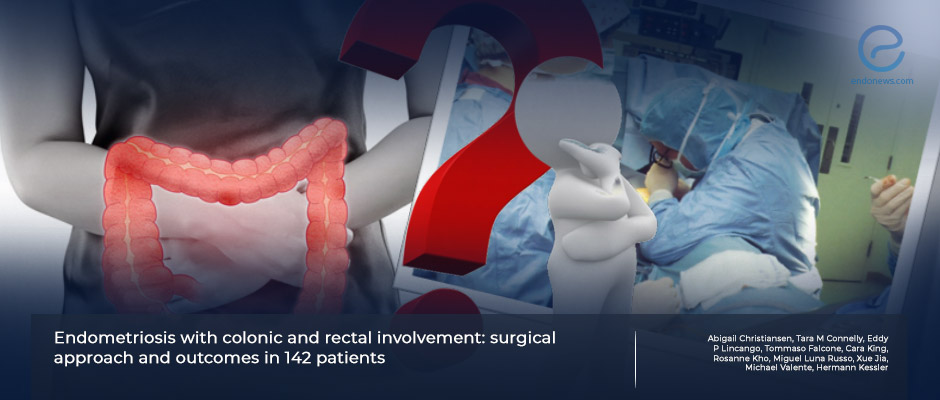Current practice in robotic surgery for deep-infiltrating endometriosis
Today, surgical excision of endometriotic lesions is the only cytoreductive procedure for managing endometriosis. Hormonal treatment may partly relieve the symptoms, but it suppresses rather than cytoreduction of the disease. Minimally invasive surgery is usually the most preferred method due…
Key Points Lay SummaryFertility outcomes after discoid excision for colorectal endometriosis.
Colorectal endometriosis is one of the most severe forms of deep endometriosis, composing 85% of all bowel lesions. Radical treatment is segmental resection of the bowels, which can cause postoperative severe complications such as rectovaginal fistula and voiding dysfunctions that negatively…
Key Points Lay SummaryThe type of surgical approach compared to complications and recurrence for colorectal endometriosis
Women with endometriosis may have extension and infiltration of the intestine, called "colorectal endometriosis, in up to 12%. The main symptoms are alterations in bowel habits, pelvic pain, and/or infertility. The gold standard management option for colorectal endometriosis is surgical…
Key Points Lay SummaryComparison of two different surgical approach to deep colorectal endometriosis in terms of postoperative outcomes.
Deep colorectal endometriosis affects one-fifth of women with endometriosis, which is commonly associated with more pelvic pain and severe gastrointestinal symptoms. Three surgical approaches for deep colorectal endometriosis are segmental colorectal resection, full-thickness discoid resection, and shaving operation. Choosing the…
Key Points Lay SummaryDoes Endometriosis Surgery Increase the Rate of Pregnancy?
Surgery to treat colorectal endometriosis leads to a high rate of pregnancy following the operation, found a new study published in the Journal of Minimally Invasive Gynecology. The authors of the study said, “studies with a high level of evidence…
Key Points Lay SummaryA comparison of symptomatology and histopathologic features in surgically resected colorectal endometriosis
Dr. Tschan and associates from Feldrich Academic Teaching Hospital, Austria published their retrospective research on patients requiring colorectal surgical resection for endometriosis in European Journal of Medical Research. Bowel endometriosis requiring colorectal surgical resection causes important morbidity. The rectum and…
Key Points Lay SummaryA Way to Better Diagnose Colorectal Endometriosis
Combining magnetic resonance imaging (MRI) with computed tomography-based virtual colonoscopy (CTC) can make the assessment of colorectal endometriosis more accurate. This is important because it can help doctors plan the surgery better and inform their patients. In order to evaluate…
Key Points Lay SummaryEffects of osteopathic manipulative therapy in patients with colorectal endometriosis
Alternative treatments have been used for colorectal endometriosis, between them Chinese medicine, acupuncture and more recently osteopathic manipulative therapy. The osteopathic manipulative therapy has been shown to reduce the chronic pain working on muscular contractions due to vicious analgesic positions.…
Key Points Lay SummaryHow rats can help improve colon endometriosis treatment in humans
Colorectal endometriosis forms about 3–37% of all deep infiltrating endometriosis (DIE) cases. DIE is a highly invasive type of endometriosis, occurs when ovarian endometriomas overgrow and rupture, releasing their contents into the abdominal and pelvic cavity, resulting in the formation…
Key Points Lay Summary
 By Selma Oransay
By Selma Oransay


 By Hale Goksever Celik
By Hale Goksever Celik


 By Özge Özkaya
By Özge Özkaya

 By Nasuhi Engin Aydin
By Nasuhi Engin Aydin


 By Laura Ardighieri
By Laura Ardighieri

 By Demet Candaş Green
By Demet Candaş Green